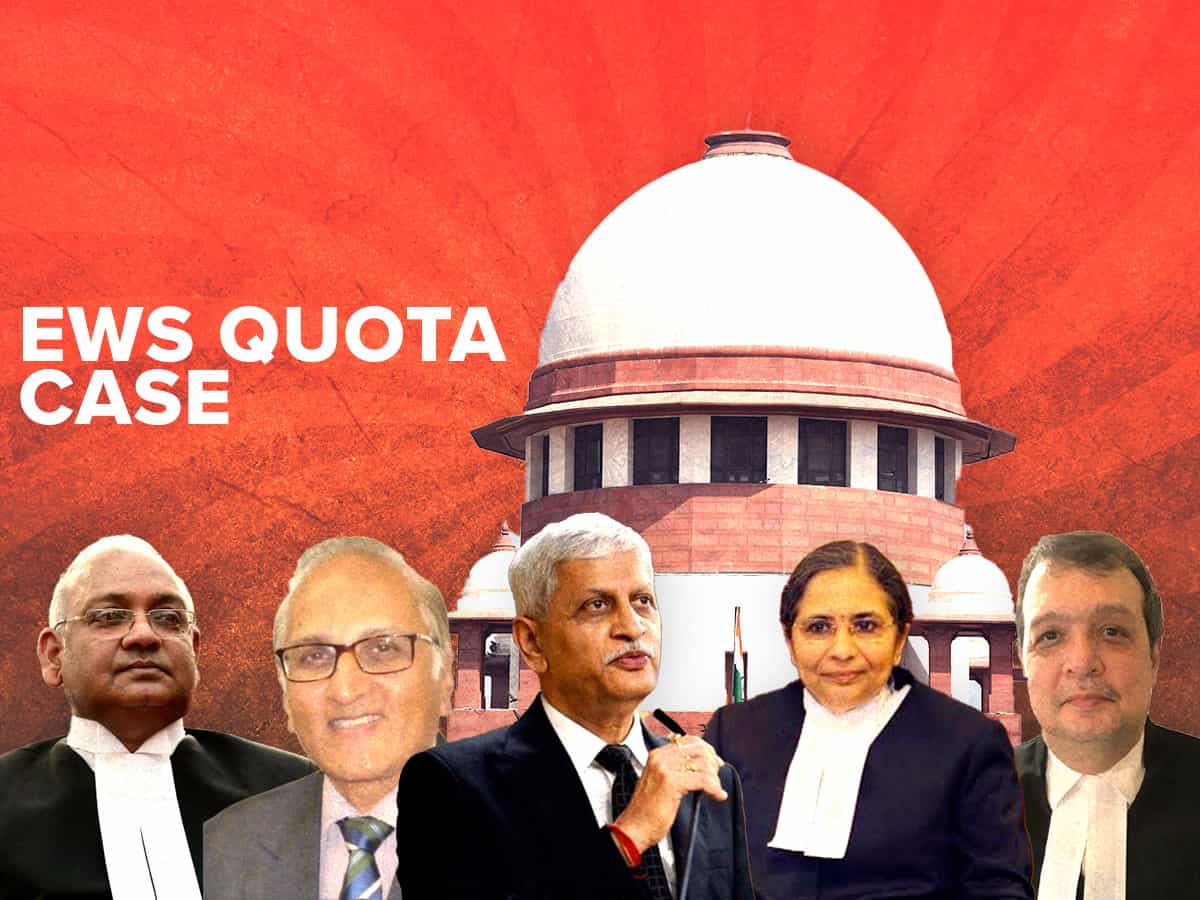
The Supreme Court on Monday upheld the validity of the 103rd Constitution amendment providing 10 percent reservation to Economically Weaker Sections (EWS) who sought admission to higher educational institutions and government jobs. Three out of five judges, who heard the petitions challenging the EWS reservation, upheld the EWS quota.
The judgment was pronounced by a five-judge bench headed by Chief Justice U U Lalit. The other judges were Justices Dinesh Maheshwari, S Ravindra Bhat, Bela M Trivedi and J B Pardiwala.
While Justice Bella, Justice Pardiwala and Justice Maheswari passed the order in favour of the EWS quota, Justice Bhat and CJI U U Lalit dissented from it stating that the quota was discriminatory.
What is the EWS quota?
The EWS quota provides a 10 percent reservation to the economically weaker sections in higher educational institutions and government jobs. It does not include those under the Other Backward Class (OBCs), Scheduled Castes (SCs) and Scheduled Tribes (STs).
This means that it applies mainly to the upper caste or loosely said, the general category, who are financially weak.
The EWS quota was recommended by a commission headed by Major General (retd) S R Sinho. The commission was formed in March 2005 when the UPA headed by former Prime Minister Manmohan Singh was in power. The report was submitted in 2010.
Who can apply for the EWS quota?
These are the requirements to apply for the EWS quota:
- You should be a ‘general’ candidate (not covered under reservation for SC, ST or OBC).
- Your family’s gross annual income should be below Rs. 8 lakhs. This includes income from all sources such as agriculture, salary, business, etc. for the financial year before you apply for the exam.
- Your family should not own agricultural land of size 5 acres or more.
- Your family should not own a residential flat of area 1000 square feet or more.
- Your family should not own a residential plot (in notified municipalities) of an area of 100 square yards or more.
- Your family should not own a residential plot (other than in notified municipalities) of an area of 200 square yards or more.
How does the EWS quota affect the Indra Sawhney Judgement?
In 1992, the Supreme Court of India in Indra Swahey v Union of India upheld the Union Government’s order that caste is an indicator of backwardness. That is, the caste system has played a significant role in discriminating against various sections of society for many years. Thus the recommendation of 50% reservations for backward classes such as Dalits in central government services was finally implemented in 1992.
The EWS judgement delivered on Monday however dilutes the Indra Swahey judgement. Justice Maheshwari argued that the EWS quota does not affect the 50% reservation owing to its flexibility.
However, Justice Bhat who opposed the EWS quota said that it will result in compartmentalisation, and the rule of the right to equality will translate into a right to reservations.
It should be noted that state governments have time and again attempted to provide reservations to a ‘specific class’ (even those unaffected by caste hierarchy). This was however not entertained, thanks to the Indra Sawhney Judgement.
Arguments set by the SC judges
Those in favour of EWS 10% quota
Justice Dinesh Maheshwari who delivered the order maintained that the EWS quota did not violate the basic structure of the Indian Constitution. “Reservation in addition to an existing reservation does not violate provisions of the Constitution,” he said.
Concurring with Justice Maheshwari, Justice Bella Trivedi said the quota cannot be termed as discriminatory if the state can justify it. “Socially and Economically Backward Classes (SEBC) form separate categories. They can’t be treated at par with the unreserved categories. The benefit under EWS can’t be said to be discriminatory,” Justice Bella said.
Echoing the two, Justice Pardiwala said reservation is not an end but a means to secure social justice. “The idea of Dr Ambedkar was to bring reservation for 10 years but it has continued. Reservation shouldn’t be allowed to become a vested interest,” he said.
Those against EWS 10% quota
Justice Ravindra Bhat said that the country’s majoritarian population comes under economically weaker sections belonging to SCs and OBCs. Their exclusion discriminates equality code and violates basic structure, he said.
“Reservation is contrary to the essence of equal opportunity. The 103rd amendment practices prohibited forms of discrimination,” he said.
He further observed that reservations were created to uproot thousands of years of wrongs on communities and castes
“Reservations designed as a powerful tool to enable equal access. Introduction of economic criteria and excluding other backward classes, SC, ST, OBC, saying they had these pre-existing benefits is injustice,” he stated.
CJI UU Lalit concurred with Justice Bhat and struck down Articles 15(6) and 16(6), calling them a violation of the equality code.



